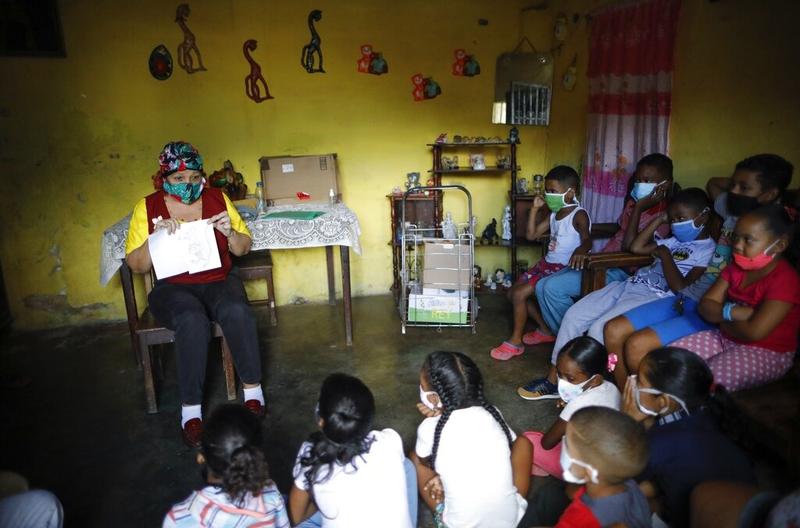 Children wearing face masks listen as as a woman tells a story, in the San Agustin neighborhood of Caracas, Venezuela, Nov 3, 2020. (ARIANA CUBILLOS / AP)
Children wearing face masks listen as as a woman tells a story, in the San Agustin neighborhood of Caracas, Venezuela, Nov 3, 2020. (ARIANA CUBILLOS / AP)
UNITED NATIONS - More than seven months into the pandemic, COVID-19 is putting education on hold for more than 137 million children -- 97 percent of students -- in Latin America and the Caribbean (LAC), according to a new UNICEF report about the devastating impacts of COVID-19 on education published on Monday.
Since the start of the pandemic, children in LAC countries have already lost on average four times more days of schooling (174) compared to the rest of the world. In a region with over 11 million cases of COVID-19 to date, most students are now at risk of missing out on an entire school year.
New UNICEF data shows that the percentage of children not receiving any form of education across the region has soared dramatically from 4 to 18 percent in the past few months
While schools are gradually reopening in several parts of the world, the vast majority of classrooms are still closed across the region. Over one-third of all countries in LAC have yet to set a date for school reopening, is was said the report.
The report also finds that COVID-19 has further widened the education gaps between rich and poor families in LAC.
New UNICEF data shows that the percentage of children not receiving any form of education across the region has soared dramatically from 4 to 18 percent in the past few months. UN projections reveal that COVID-19 may push up to 3 million additional children out of school in LAC.
READ MORE: UNICEF chief: Global childcare crisis worsening amid pandemic
The education gains earned by LAC over the past decades are now "at risk of being reversed." The economic impact of this education crisis will be felt for years to come, said the report.
Together with partners, UNICEF teams are on the ground working to protect children's right to learn in every single country across LAC. Since the beginning of the school closures, about 42 million students in the region have been receiving UNICEF-supported distance and home-based learning delivered through radio, TV, internet, and other platforms.
However, new UNICEF estimates suggest that despite government efforts, only one in two children from public schools are accessing quality distance learning at home compared to three in four children from private schools. Radio, TV and internet education programs should be strengthened to reach students who are less connected to the internet. Before and beyond school reopening, bridging the current digital gap helps build more resilient education systems to withstand potential future crises together with the private sector.
While one in six schools lack access to water in LAC, UNICEF calls upon governments to urgently accelerate the preparedness for reopening of schools including installing water, sanitation and hygiene facilities, training teachers and adopting more inclusive learning approaches.
ALSO READ: Education: UN chief warns of 'generational catastrophe'
While the epidemiological situation is diverse between and within countries, the reopening of schools must be a priority for governments, the report noted.
UNICEF urges countries across the region to protect and increase education budgets, with special attention to the needs of the marginalized children most at risk of dropping out of school.


